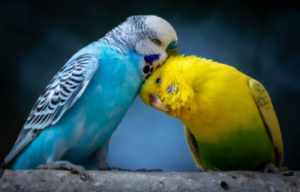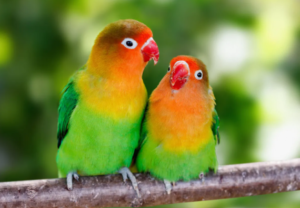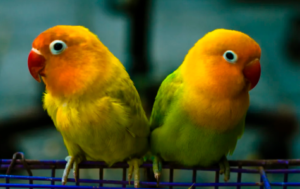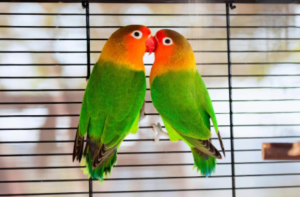Lovebirds, with their striking colors and affectionate personalities, are small parrots that have captured the hearts of bird enthusiasts worldwide. Whether you’re a novice bird owner or a seasoned avian caretaker, knowing the true cost of owning a lovebird is essential for making an informed decision. This guide provides a detailed look at the expenses associated with purchasing and caring for lovebirds, helping you budget effectively while enjoying the companionship of these charming creatures.
Introduction to Lovebirds

Lovebirds belong to the genus Agapornis and are native to Africa and Madagascar. These petite parrots are well-known for their strong pair bonds, playful behavior, and ability to form close relationships with their human caregivers.
There are nine species of lovebirds, but not all are commonly kept as pets. Popular species like the Peach-Faced, Fischer’s, and Masked Lovebirds are widely available, while rarer ones, such as the Black-Cheeked Lovebird, are more elusive and expensive.
Read this article also: How Much Does an Indian Ringneck Parakeet Cost?
How Much Does a Lovebird Cost in 2024?

The price of a lovebird varies depending on factors like species, age, coloration, and source. Below is a detailed breakdown to help you understand the price ranges:
1. Common Lovebird Species
- Peach-Faced Lovebirds: $50–$150
- Fischer’s Lovebirds: $75–$200
- Masked Lovebirds: $80–$200
These species are popular due to their availability and relatively low price.
2. Rare and Exotic Species
- Black-Cheeked Lovebirds: $300–$500
- Lilac-Crowned Lovebirds: $200–$400
Rarity drives up the price for these species, making them more expensive.
3. Color Mutations
Selective breeding has resulted in beautiful color mutations that are often pricier:
- Albino or Lutino Lovebirds: $100–$300
- Blue or Violet Mutations: $150–$400
4. Hand-Tamed or Trained Lovebirds
Lovebirds that have been hand-raised or trained by breeders are more expensive due to the additional care and time invested:
- Hand-Tamed Birds: $150–$400
5. Breeding Pairs
If you’re interested in breeding lovebirds, purchasing a pair can cost significantly more:
- Breeding Pairs: $200–$600
What Influences Lovebird Prices?

Several factors contribute to the cost of lovebirds:
Species Rarity
Some species are harder to find due to limited breeding or conservation concerns, making them more expensive.
Age of the Bird
- Chicks (8-12 weeks): These younger birds are easier to tame and thus more sought after.
- Adults: Slightly cheaper but may take longer to bond with their new owners.
Location
In regions where lovebirds are scarce, prices are generally higher due to transport and demand.
Breeder Reputation
Reputable breeders often charge more because they prioritize health, temperament, and socialization.
Color Variations
Unique or rare color mutations are in high demand, significantly increasing the price.
Additional Costs of Owning a Lovebird
Owning a lovebird involves more than just the initial purchase. Proper care requires ongoing investment in housing, diet, and medical attention.
1. Housing Costs
Cage: $50–$300
- A spacious cage with dimensions of at least 24×24 inches is recommended.
Perches: $10–$30
- Natural wood perches are ideal for foot health.
Toys: $20–$50
- Lovebirds need toys to stay mentally stimulated.
Food and Water Bowls: $10–$20
2. Dietary Expenses
A balanced diet is crucial for your lovebird’s health.
- Pellets and Seeds: $10–$30 per month
- Fresh Produce: $5–$15 per month
Include fruits like apples and vegetables like spinach. Avoid avocados and chocolate, which are toxic to birds.
3. Veterinary Care
Regular checkups and emergency care are essential for ensuring your lovebird’s well-being.
- Initial Health Checkup: $50–$100
- Annual Exams: $50–$80
- Emergency Visits: $100–$300
4. Grooming
Periodic grooming is necessary for maintaining your bird’s health.
- Wing Clipping: $10–$20
- Nail Trimming: $10–$15
5. Miscellaneous Supplies
- Transport Cage: $20–$50
- Breeding Boxes (if applicable): $30–$60
Where to Buy Lovebirds?
Knowing where to buy a lovebird can make a significant difference in quality and cost.
Reputable Breeders
Breeders are often the best source for healthy and socialized birds. Prices from breeders may be higher, but the assurance of quality care is worth the investment.
Pet Stores
Pet stores often have lower prices but may lack the specialized care provided by breeders.
Adoption Centers
Many shelters have lovebirds available for adoption at a fraction of the cost.
Online Marketplaces
Websites like BirdBreeders.com offer a variety of options, but caution is essential to avoid scams.
How to Choose a Healthy Lovebird

When selecting a lovebird, ensure it is healthy and well-cared-for.
Observe the Bird’s Appearance:
Bright, smooth feathers and clear eyes indicate good health.
Check for Active Behavior:
Healthy lovebirds are playful and curious.
Ask About the Bird’s History:
Request details about vaccinations and dietary habits.
Inspect the Environment:
A clean cage and environment suggest the bird has been well-cared-for.
Why Lovebirds Are Worth the Cost
Despite their expenses, lovebirds bring immense joy to their owners. Their vibrant personalities, intelligence, and affectionate nature make them a rewarding pet. With proper care, a lovebird can live 10–15 years, providing years of companionship.
Cost-Saving Tips for Lovebird Owners
Adopt Instead of Buy:
- Rescue shelters often have lovebirds available at lower prices.
Buy Second-Hand Supplies:
- Save on cages and accessories by purchasing gently used items.
DIY Toys:
- Create toys using household items like cardboard tubes and paper.
Conclusion
Lovebirds are captivating creatures that make excellent pets for bird enthusiasts. In 2024, their cost ranges from $50 to $500, depending on species, color mutation, and source. However, owning a lovebird involves ongoing expenses, including diet, housing, and veterinary care.
By budgeting appropriately and choosing a healthy bird from a reputable source, you’ll ensure your feathered friend thrives in their new home. Lovebirds are more than just a purchase—they’re an investment in joy and companionship that lasts for years to come.
Start your journey today and experience the joy of owning one of nature’s most delightful pets!
